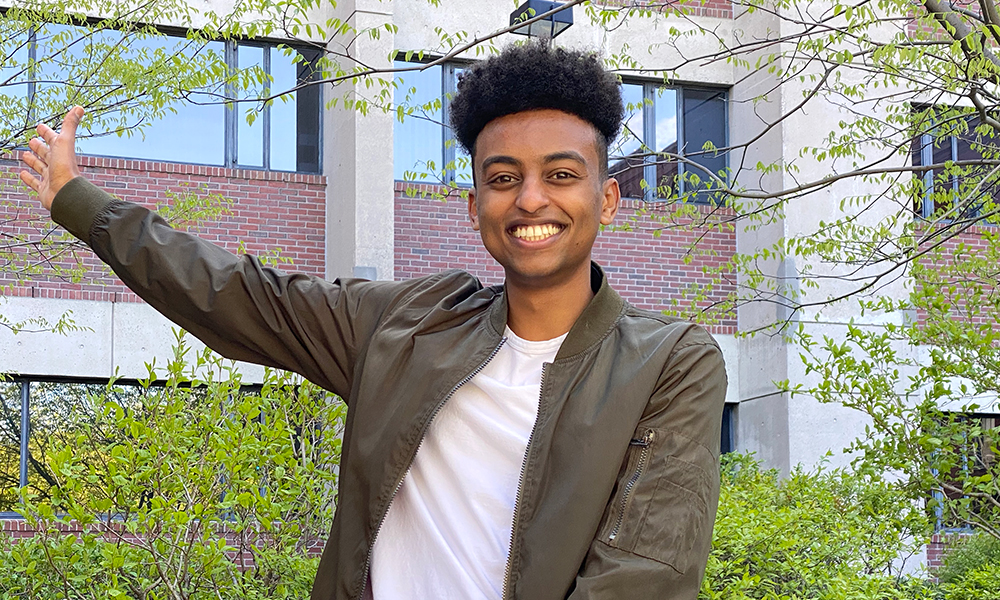MCB concentrator Aaron Abai (‘22) has been elected to the Harvard chapter of the prestigious academic honor society Phi Beta Kappa (PBK). Founded in 1776, PBK is the oldest continuously operating academic honor society in North America. In addition to celebrating students’ scholastic accomplishment, membership in PBK enables access to valuable opportunities for networking and sharing ideas.
Each spring, the Harvard chapter of PBK inducts 24 juniors based on their superlative grades, letters of recommendation, and breadth of study. Abai was floored to find out he had been chosen as one of the 2021 “Junior 24.”
“I feel incredibly grateful and excited to be elected into PBK as a junior! And very, very shocked!” Abai says. “It’s been a whirlwind of a week, and I’m still definitely processing it all…After I saw the word ‘congratulations,’ I immediately FaceTimed my mom. I was honestly quite overwhelmed by emotion, but mostly felt so much gratitude and love for all the people who have supported and mentored me throughout my time at Harvard and before.”
“Especially since I’m a first-generation college student, something like PBK has always seemed unattainable,” he adds. “I’ve definitely had moments where I’ve felt lost and like I didn’t know what I was doing. For me, it’s been helpful to lean on others and to remind myself that it is perfectly okay to feel that way. It’s often during these moments where I learn the most about myself. I’ve realized that this is all just part of the process of becoming who I am supposed to become.”
Abai has taken many courses in social sciences and the humanities alongside his studies in biology. In addition to his MCB concentration, he is pursuing a secondary in African-American Studies and a language citation in Amharic. “Generally I’ve just tried to take courses that uplift marginalized narratives and that allow me to explore questions around identity and social justice,” he says. “I care a lot about the fight for racial justice and social justice more broadly, and try to bring this perspective into everything I do.”
He cites a course called “Understanding Islam,” taught by Middle Eastern Studies professor Ali Asani as especially impactful. “In his class, we’ve learned about the cultural studies approach, which talks about the importance of considering context when talking about constructions of knowledge,” Abai explains. “This approach has helped me appreciate that scientific knowledge, too, is situated within human contexts. Far from objective, interpretations of scientific knowledge influence and are influenced by societal structures and inequities.”
Life sciences coursework has also been central to Abai’s Harvard experience. His favorite biology classes include an immunology course led by MGH faculty Shiv Pillai and “Cell Biology in the World” taught by the late MCB Faculty Rob Lue (1964-2020). “As much as I love biology for the sake of biology, I’ve actually found the most fulfillment in my studies of the sciences when thinking about it in a social context,” Abai says. “Professor Lue was another professor who had a big impact on my thinking, and I was really saddened by his loss.”
Abai has further been exploring how social dynamics shape biology and medicine by conducting on vaginal microbiomes and HIV acquisition in Doug Kwon’s lab at Ragon Institute of MGH, MIT, and Harvard. “We work with a cohort of young, Black South African women, some of whom I got to meet the summer after my first-year,” Abai says. “Having had the experience of being the only Black person in a science classroom, in a laboratory, and in so many other academic spaces, I definitely consider my interest in studying race and in studying science as inseparable.”
Abai expresses gratitude to people throughout his support network. “Being elected to PBK has been incredibly humbling, and is reflective of the amazing support system that I feel so lucky to have,” he says. “This accomplishment is no more my own than it is of all the people that have guided, supported, and mentored me into the thinker I am today.”
His list of individuals to thank includes: Pillai, Asani, MCB Concentration Adviser Dominic Mao and Program Coordinator Irina Cashen, his sophomore adviser Anas El Turabi, CCB Senior Preceptor Lu Wang, CCB Faculty Christina Woo, research mentors Doug Kwon and Seth Bloom, Abai’s research collaborators in Colorado and South Africa, and other mentors and teachers—as well as friends, peers, and family. “My peers are really some of the most amazing, accomplished, and brilliant students and people I know,” Abai says. “I’m always so impressed by how talented my friends are, they truly push me to be the best version of myself. There’s so much luck that went into this process [of election to PBK], and so many of my brilliant friends and peers would have been equally qualified for this recognition.”
Abai can often be found rolling to and from science buildings on his “trusty” scooter, which he is pictured with above, saying, “Also shout out to the MCB60 scooter gang from sophomore year!”
“Thank you to my amazing friends, who have taught me so much and never cease to amaze me with their wit and compassion,” Abai adds. “And finally, thank you to my parents, brothers and the rest of my family—I am nothing without your love, support, and sacrifices.”


